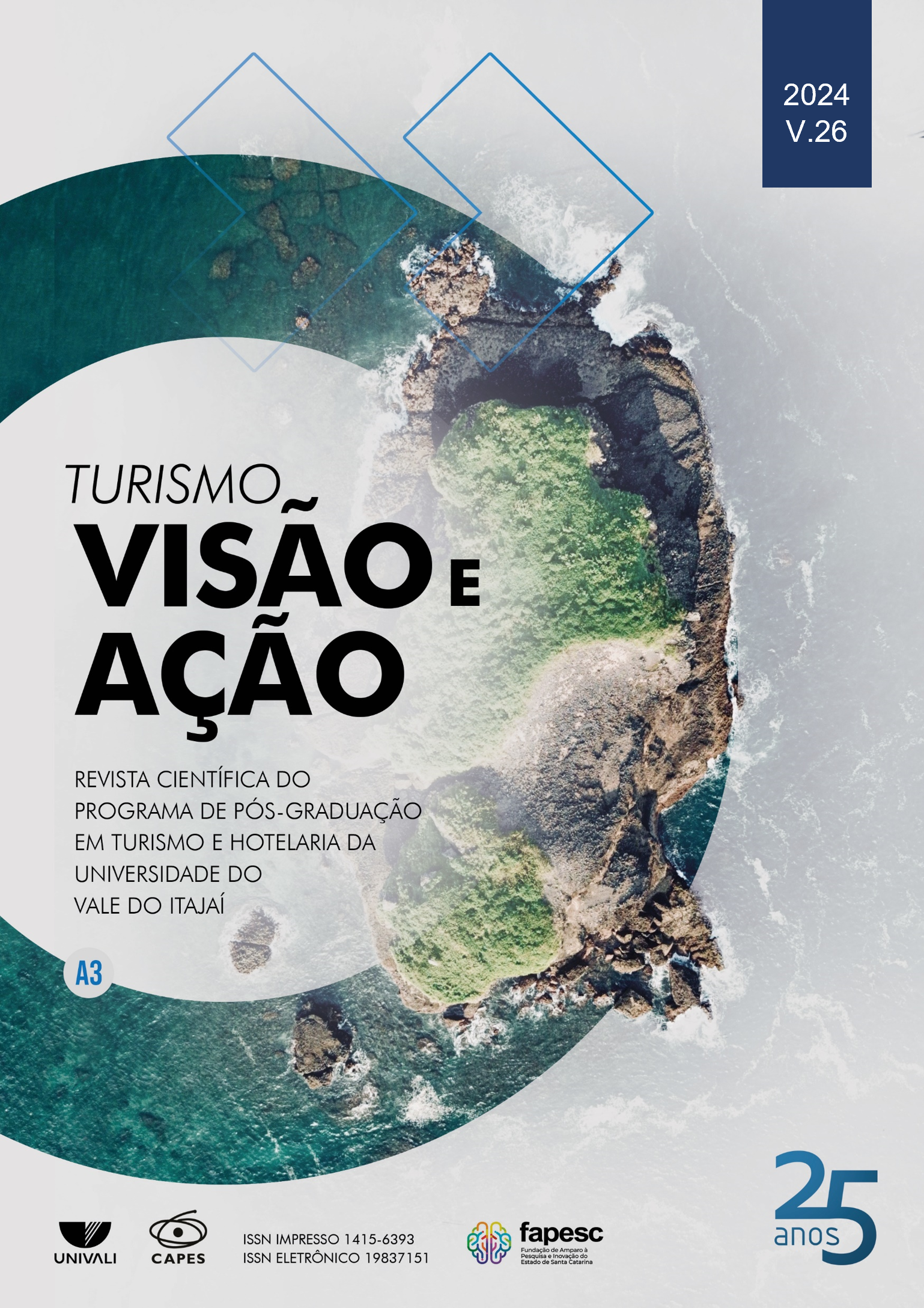
Society 5.0 represents a new step in technological evolution for the benefit of humanity, bringing more quality of life, social inclusion, and sustainability. Tourism, in turn, directly benefits from technological advancements, as it is an area open to innovations brought by Society 5.0. Therefore, the objective of this study is to examine the effects of Information and Communication Technologies (ICT) related to Society 5.0 on tourism, as presented in e-books from the World Tourism Organization (UNWTO). In this qualitative and exploratory study, was adopted the e-library section of the UNWTO portal for material collection, considering the annual interval from 2016 to 2023—the first year of Society 5.0 citation and the year of this study’s realization, respectively. The choice of the UNWTO library is justified because it is the largest online collection of publications and statistics in the field of tourism. Using the search criteria ‘society 5.0,’ the results showed a total of 1,438 materials, of which 85 were analyzed. Through a qualitative content analysis methodology, comprehensive impacts were identified in sectors related to public policies, destination management, and resources. The use of various information and communication technologies allowed the identification of several solutions, highlighting improvements in tourist reception, community quality of life, sustainability, territorial promotion, robust information, and ease of making reservations for tourism experiences. All these technological features contribute to providing tourists with a more autonomous and enriching experience.




Acerenza, M. Á. (2006). Conceptualización, origen Y evolución del turismo. Trillas.
Aires, J., Costa, C., & Brandão, F. (2022). Rumo a um conceito de inovação no turismo. Revista Brasileira de Pesquisa Em Turismo, 16(e-2577). https://doi.org/https://doi.org/10.7784/rbtur.v16.2577
Alimohammadlou, M., & Khoshsepehr, Z. (2023). The role of Society 5.0 in achieving sustainable development: a spherical fuzzy set approach. Environmental Science and Pollution Research, 30, 47630–47654. https://doi.org/https://doi.org/10.1007/s11356-023-25543-2
Andrade, J. V. (2002). Turismo: Fundamentos e dimensões. Editora Ática.
Bardin, L. (2011). Análise de conteúdo. Edições 70.
Beni, M. C. (2001). Análise estrutural do turismo. Senac.
Brito, B. D. M. (2017). Tecnologia da informação turística. SESES.
Christou, P. A. (2022). The history and evolution of tourism. CABI.
Çipi, A., Fernandes, A. C. R. D., Ferreira, F. A. F., Ferreira, N. C. M. Q. F., & Meidute-Kavaliauskienè, I. (2023). Detecting and developing new business opportunities in society 5.0 contexts: A sociotechnical approach. Technology in Society, 73, 102243. https://doi.org/https://doi.org/10.1016/j.techsoc.2023.102243
Corrêa, S. C. H., & Gosling, M. d. S. (2023). A experiência turística inteligente na perspectiva do viajante. Turismo - Visão e Ação, 25(1), 72–93. https://doi.org/10.14210/rtva.v25n1.p72-93
da Costa Tavares, M. d. C., & do Carmo Azevedo, G. M. (2021). Society 5.0 as a contribution to the Sustainable Development Report. In: de Carvalho, J. V., Rocha, Á., Liberato, P., & Peña, A. (Eds.), Advances in Tourism, Technology and Systems (pp. 49–63). Springer. https://doi.org/https://doi.org/10.1007/978-981-33-4256-9_5
De La Torre, O. (1992). El turismo, fenomeno social. Fundo de cultura económica.
Ferreira, J. N. (2019). Bem-vindos à sociedade 5.0 Bem-vindos (de volta) à era das pessoas. Eco. https://eco.sapo.pt/especiais/bem-vindos-a-sociedade-5-0-bem-vindos-de-volta-a-era-das-pessoas/
Fukuyama, M. (2018). Society 5.0: Aiming for a new human-centered society. Japan Spotlight, 27(5), 47–50.
Fundação Instituto de Administração. (2019). Sociedade 5.0: O que é, objetivos e como funciona. https://fia.com.br/blog/sociedade-5-0/
Joyce, S. (2013). A brief history of travel technology - From its evolution to looking at the future. https://www.phocuswire.com/A-brief-history-of-travel-technology-from-its-evolution-to-looking-at-the-future
Keidanren. (2017). Society 5.0 for SDGs. https://www.keidanren.or.jp/en/policy/csr/2017reference2.pdf
Machado, F. N. R. (2018). Big Data: o futuro dos dados e aplicações. Saraiva.
Mathieson, A., & Wall, G. (1982). Tourism: economic, physical and social impacts. Longman.
Mcintosh, R. W., Goeldner, C. R., & Ritchie, J. R. B. (2000). Turismo: Planeación, administración y perspectivas. Limusa Noriega Editores.
Mitra, A., & Chaurasia, R. (2022). Emerging Technologies and Global Pandemic. In: Shaw, R., & Gurtoo, A. (Eds.), Global Pandemic and Human Security. Springer. https://doi.org/https://doi.org/10.1007/978-981-16-5074-1_20
Mourtzis, D., Angelopoulos, J., & Panopoulos, N. (2023). The Future of the Human–Machine Interface (HMI) in Society 5.0. Future Internet, 15(5). https://doi.org/https://doi.org/10.3390/fi15050162
Nações Unidas Brasil. (2015). Transformando nosso mundo: A agenda 2030 para o desenvolvimento sustentável. https://brasil.un.org/sites/default/files/2020-09/agenda2030-pt-br.pdf
Pencarelli, T. (2020). The digital revolution in the travel and tourism industry. Information Technology & Tourism, 22, 455–476. https://doi.org/https://doi.org/10.1007/s40558-019-00160-3
Rabahy, W. A. (2019). Análise e perspectivas do turismo no Brasil. Revista Brasileira de Pesquisa Em Turismo, 14(1), 1-13. https://doi.org/http://dx.doi.org/10.7784/rbtur.v14i1.1903
Schwab, K. (2016). A quarta revolução industrial. Edipro.
SEBRAE. (2022). Saiba como a sociedade 5.0 pode revolucionar o setor de turismo. https://www.sebrae.com.br/sites/PortalSebrae/artigos/saiba-como-a-sociedade-50-pode-revolucionar-o-setor-de-turismo,717f9f46b04d4810VgnVCM100000d701210aRCRD
Stankov, U., & Gretzel, U. (2020). Tourism 4.0 technologies and tourist experiences: a human-centered design perspective. Information Technology & Tourism, 22, 477-488. https://doi.org/https://doi.org/10.1007/s40558-020-00186-y
United Nations Environment Programme, & World Tourism Organization. (2005). Making tourism more sustainable - A guide for policy makers (english version). UNEP and WTO. https://doi.org/https://www.e-unwto.org/doi/book/10.18111/9789284408214
Vanhove, N. (2016). Tourism. In: Jaffari, J., & Xiao, H. (Eds.), The encyclopedia of tourism (p. 953-955). Springer International.
Yukari, L. (2020). O Japão no futuro da humanidade: Sociedade 5.0. Internacional Da Amazônia. https://internacionaldaamazonia.com/2020/01/22/o-japao-no-futuro-da-humanidade-sociedade-5-0/
Zengin, Y., Naktiyok, S., Kaygin, E., Kavak, O., & Topçuoglu, E. (2021). An investigation upon industry 4.0 and society 5.0 within the context of sustainable development goals. Sustainability, 13(5), 2682. https://doi.org/https://doi.org/10.3390/su13052682




Copyright (c) 2024 Turismo: Visão e Ação
This work is licensed under a Creative Commons Attribution 4.0 International License.






Turismo: Visão e Ação, linked to the Graduate Program in Tourism and Hospitality - Master's and Ph.D., is a scientific journal published in a continuous flow system, with an interdisciplinary and international scope. According to Qualis/CAPES criteria (2017-2020), it is classified as 'A3' in the fields of Administration, Accounting Sciences, and Tourism. Registered with ISSN number 1983-7151, Tourismo: Visão e Ação began its activities in 1998 with printed publications in English and Portuguese. In 2008, it transitioned to an online publication, expanding its reach to a broader audience. It maintains a policy of being an open-access journal without submission or access fees. The abbreviated title for the journal is Tur., Visão e Ação, commonly used in bibliographies, footnotes, references, and bibliographic captions.
Universidade do Vale do Itajaí- Quinta Avenida, 1100, bloco 7, CEP: 88337-300, Balneário Camboriú, SC – Brasil. Tel.: +55 47 3261-1315, e-mail: revistaturismo@univali.br

